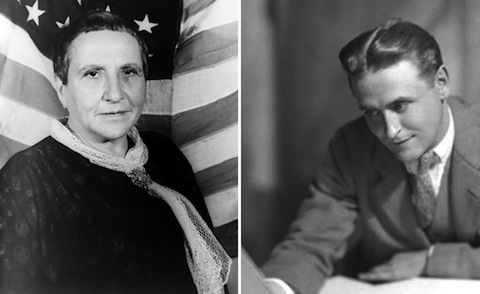
“Here we are and have read your book and it is a good book.” That sentence about The Great Gatsby may read, in isolation, like one out of a particularly unmotivated high school student’s summer-reading report. But it actually comes from astute woman of letters Gertrude Stein in a letter — and, in its way, a review of the then-new novel — to F. Scott Fitzgerald himself. This missive from one distinguished literary member of America’s “Lost Generation” to another continues as follows:
I like the melody of your dedication and it shows that you have a background of beauty and tenderness and that is a comfort. The next good thing is that you write naturally in sentences and that too is a comfort. You write naturally in sentences and one can read all of them and that among other things is a comfort. You are creating the contemporary world much as Thackeray did his in Pendennis and Vanity Fair and this isn’t a bad compliment. You make a modern world and a modern orgy strangely enough it was never done until you did it in This Side of Paradise. My belief in This Side of Paradise was alright. This is as good a book and different and older and that is what one does, one does not get better but different and older and that is always a pleasure. Best of good luck to you always, and thanks so much for the very genuine pleasure you have given me. We are looking forward to seeing you and Mrs. Fitzgerald when we get back in the Fall. Do please remember me to her and to you always
Gtde Stein
Stein’s words, come to think of it, might make just the ticket for the aforementioned English-class slacker who may have actually read The Great Gatsby, and might even have enjoyed it, but can’t pin down what everyone expects him to respect about it. “You write naturally in sentences and one can read all of them” tells you everything you need to about why so many other skilled writers have made a habit of re-reading the novel every decade, every year, even every few months. “You are creating the contemporary world” sums up much of Fitzgerald’s thematic accomplishment, and that bit about “a modern orgy” makes the point much more vivid indeed. And thinking in the longer term, this hypothetical teenager might well benefit from the piece of all-purpose wisdom that “one does not get better but different and older and that is always a pleasure.”
You can find much more pleasure of the literary-historical variety at Letters of Note, which originally posted this one. While there, do consider taking a look at what Fitzgerald’s editor said about an early Gatsby draft, and a rejection of Stein’s The Making of Americans.
via Letters of Note
Related Content:
Gertrude Stein Gets a Snarky Rejection Letter from Publisher (1912)
Haruki Murakami Translates The Great Gatsby, the Novel That Influenced Him Most
83 Years of Great Gatsby Book Cover Designs: A Photo Gallery
Colin Marshall hosts and produces Notebook on Cities and Culture and writes essays on literature, film, cities, Asia, and aesthetics. He’s at work on a book about Los Angeles, A Los Angeles Primer. Follow him on Twitter at @colinmarshall.


I find TGG unreadable. I hate the principal characters and I hate their raisons d’etre. Even the narrator is annoying. Does anyone else find that? Or do you think I’m losing my critical mind?
most people hate it. very little people like it. I never read it in school, and i am nostalgically attached to it. The language alone was great to many people, not any more, but to many then and to some now.
Gertrude Stein is certainly *not* a member of “the list generation.” In fact, the term is one that she (purportedly) invented to describe the second generation of American expat writers to come to Paris.
Last week I was at Yale’s Beinecke Library of Rare Books and spent time with the presentation first edition of ‘The Great Gatsby’ that Fitzgerald gave to Stein and personally inscribed.
I’ve also seen a letter to Stein from Fitzgerald after her review of ‘Gatsby’ but until now hadn’t seen Stein’s review. Thank you for completing this circle.